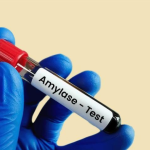
AMYLASE - SERUM
Tested By Apollo
The amylase – serum test, often referred to as the S amylase test or simply the amylase test, is a specific type of blood examination. This test is primarily performed to measure the level of an enzyme called amylase in your bloodstream. Amylase is a critical enzyme the body naturally produces to help break down carbohydrates into simpler sugars, aiding digestion. The pancreas and salivary glands are primarily responsible for its production. The Sr amylase test, another term used for thi
Lab Test Details
Description
What is the Purpose of the Amylase – Serum Test?
The blood amylase test's purpose varies across diverse health scenarios:
Tracks Pancreatic Health: This simple blood examination primarily assesses the functions of your pancreas. An elevated level of amylase in your blood might indicate an issue with this organ.
Diagnoses Acute Pancreatitis: The amylase – serum test is often used to diagnose acute pancreatitis, a condition where your pancreas becomes inflamed.
Detects Other Diseases: Other than pancreatitis, this test can also help detect other diseases such as cystic fibrosis or salivary gland infections.
Monitors Treatment Effectiveness: Doctors often use the amylase – serum test to monitor the effectiveness of the treatment being given for illnesses linked with high levels of amylase.
Confirms Diagnosis: Lastly, physicians often order this test in combination with another one called the amylase lipase test (or amylase & lipase test) to confirm their diagnosis.
Who Should Get an Amylase – Serum Test Done?
Getting an amylase test done is usually recommended for individuals who exhibit certain signs and symptoms or are at risk of particular health conditions. Here are some categories of people who should consider getting this blood amylase test:
Individuals Experiencing Abdominal Pain: The most common reason doctors suggest an amylase test is to identify the cause of sudden or severe abdominal pain. This could potentially be due to pancreatitis, gallbladder disease, or a blocked bile duct.
People with Suspected Pancreatitis: The amylase test helps diagnose pancreatitis by determining if the amylase levels in your blood are elevated beyond the normal range.
Patients with Cystic Fibrosis: Doctors may recommend a Sr amylase test as part of routine check-ups for cystic fibrosis patients as this condition frequently affects pancreatic function.
Individuals with Family History: If you have a family history of pancreatic disorders, getting periodic amylase tests can help detect early signs and manage potential risks effectively.
If any of these points resonate with you, consider consulting your doctor about getting a blood amylase test done. Always remember, the decision to get an amylase test done should be based on your doctor's advice and your health situation.
Components of an Amylase – Serum Test
The S amylase test is a comprehensive assessment offering valuable insights into the amylase levels in your blood. This test comprises only a single component:
Amylase – Serum: As mentioned above, this blood test measures the amount of amylase enzyme present in your bloodstream. High or low levels can indicate a range of health issues, including pancreatitis, liver or kidney problems, or cystic fibrosis. If the doctor suspects imbalances due to conditions like abdominal pain, they may recommend this test.
Understanding the Amylase – Serum Test Report
Parameter
Normal Range
High Range
Amylase – Serum
30–110 U/l
> 110 U/l
Note: The values of this test can vary depending on the laboratory, age, sex, and underlying conditions.
Amylase – Serum
High values may indicate
Low values may indicate
Pancreatitis or other digestive disorders
Pancreatic cancer
Obstruction of the pancreatic duct
Salivary gland disorders
Severe liver disease
Pancreatic insufficiency
Cystic fibrosis
Preparation and Procedure for the Amylase – Serum Test
It's crucial to understand the amylase test preparation and procedure involved in ensuring accurate results. It is a straightforward test with minimal test requirements. In the following subsections, you will explore in detail how you can prepare for this test.
How is the Amylase – Serum Test Done?
The blood amylase test can be conducted in the following steps:
Preparation:
No specific fasting is required before this test. However, you should follow all instructions given by your doctor.
Avoid consuming alcohol for at least 24 hours before the test.
Certain medications may also affect the amylase test result. Therefore, it's crucial to inform your doctor about all medications and supplements you are currently taking.
Procedure:
The Sr amylase test is done by a phlebotomist or lab technician who collects a small sample of your blood.
They will clean your arm with an antiseptic, then use a tourniquet (a tight band) around your upper arm to make your veins more visible.
Using a sterile needle, they draw out a small amount of blood and immediately apply a cotton ball over the puncture site to stop any bleeding.
The blood sample is then sent to a laboratory where it is analysed for amylase levels.
Is Fasting Required for an Amylase – Serum Test?
No. Unless instructed otherwise by your doctor, you're free to eat and drink normally before the test. There is no need for fasting or altering your existing diet.
What Time of the Day Should I Undergo an Amylase – Serum Test?
It's advisable to schedule your amylase test at a time convenient for you. There's no specific time of the day required for an amylase – serum test.
₹ 333.00 ₹ 250.00
-
Free Shipping
For orders from ₹500 -
-
-
